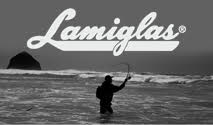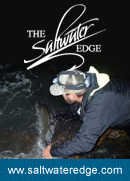Many readers here have a strong interest in striper nostalgia, whether it be old lures, antique surfcasting tackle, photographs, or even just stories from the “Golden Age” of striper fishing.
But also buried somewhere in there is the unpleasant truth that most fishermen of the time (recreational and commercial) believed the supply of fish was limitless. There was no shame in killing more fish than one knew what to do with. While many of the surfcaster “high-liners” of the time were selling fish to keep themselves solvent during their fishing binges, others opted to give away fish to the whole neighborhood before even thinking of letting anything swim away.
By most accounts, full time commercials were doing serious damage as well.
Out of all the so-called “excessive” fishing practices of past generations, none stirs emotions quite like ocean haul seining or “beach netting.” And if there was an ironic twist here, no other user group can claim as rich a heritage in local fishing than the people who practiced haul seining on Long Island – the East Hampton Baymen.
Readers with an interest in seeing this history through the eyes of a Bayman during the “golden days” have a rare opportunity, thanks to a revival of the theatric adaptation of Men’s Lives, now playing at the Bay Street Theater in Sag Harbor, Long Island.
The play, first run in 1992, is based on the 1986 book by Peter Matthiessen. The opening scene finds a younger Matthiessen, alone in the Amagansett dunes, almost haunted by the memories of an extended family of East Hampton Baymen.
Thus begins a story of Montauket Indians, early settlers, the rise and fall of whaling, harpooning swordfish, and finally the beginning of the end of the Bayman’s way of life. The fatal blow reportedly comes at the hands of surfcasters, in the form of a bill to ban beach haul seining in New York.
Those who read or watched “The Perfect Storm” will see familiar characters and themes, though playwright Joe Pintauro, with a superb cast of Broadway/Off Broadway caliber actors, delivers a much more powerful account of a fishing family coming to terms with the notion that they are the last of their kind.
Current surfcasters will be amused – if not insulted – at the portrayal of the arrogant “sportie” surfcaster from Westchester, who shows up on a local beach with a boom box and live eels.
“If you are fishing for sport, why make it so easy by using live eels?” jabs one of the Baymen?
To which our surfcaster, an advertising executive, brags at how he doesn’t actually eat fish himself, he just sells them to restaurants to pay for his Montauk hotel bills.
Playright Joe Pintauro and this cast might have you leaving the theater feeling the Baymen were done some seruious wrong by the surfcasters and Albany. But there are no piles of dead fish on the beach, there is no sesne of fish once in good supply that disappeared, and there is no sense of surfcasters and conservationists who weren’t buying the “they come and go in cycles” argument, and were downright terrified at the thought of the striper being completely wiped out.
Likewise, while the outlaw of haul seining was a defining moment locally, this specific net ban does little to explain how so many other traditional fishing and clamming occupations have disappeared, up and down the coast. Only when we comprehend the macroeconomic “big picture” do we have a chance at salvaging the rish history that the Baymen represent.
“I hope that play didn’t make you feel guilty, especially you being a surfcaster,” my wife commented over a drink at a nearby Sag Harbor pub.
She continued, “My family was all farmers, and your family coal miners, we don’t do that now, we can’t do that now, even if we wanted to.”
And while I wholeheartedly agreed with her, its clear I could have seen myself following my grandfather into haul seining long before ever thinking of setting foot in an anthracite coal mine in Pennsylvania. Even with the widescale hardship and coal miner’s Black Lung that helped kill my grandfather at 39, the quote “It’s not coal ye’re burnin’, it’s men’s lives,” just doesn’t stir emotions like when applied to fishing.
I am sure each of you has your own family story of hardship and change.
Sometimes change is good. But sometimes change, like a total loss of the Baymen and Watermen from our community, risks pushing us all further from that connection to the water that we all agree is so important.
Perhaps more on this in a future blog post.
For those who love stories of fishing, and historical accounts of “how it was” on the striper coast – whatever your own views – you’d be hard pressed to find something as powerful as this theatric adaptation of Men’s Lives.
Men’s Lives runs until July 29 at the Bay Street Theater in Sag Harbor, Long Island.
http://www.baystreet.org/Calendar/?eventID=447
Any epilogue to Men’s Lives would note that the predicted demise of the Baymen, and beach netting, did not come to pass, not entirely anyway. See this related blog post from last year.
http://surfcastersjournal.com/blog/2011/12/05/the-more-things-change-the-more-they-stay-the-same/
[issuu width=420 height=162 shareMenuEnabled=false showHtmlLink=false proSidebarEnabled=true backgroundColor=%23222222 documentId=120707201511-7f8cda4eee37461cb729655825046239 name=issue14 username=surfcasters_journal tag=fishing unit=px v=2]












Sportfisherman all my life…commercial fisherman about half.
↓know both sides…neither is wearing halos…just people fishing.
First bass I ever caught on beach I released,not having an idea in my head about conservation,it just felt rite to return her. Just sayin.
↓Read the book and loved it. Going to see the show tomorrow.
↓Men’s Lives is a great read, at yard/estate sales I buy that book and “At Play in the Fields of the Lord”, also by Matthiessen, and give them to whoever is interested in LIFE and a great read… Check out “In the Spirit of Crazy Horse” and “The Snow Leopard” by him, as well…
↓Coincidentally, I’m half way through the book. It’s a great read.
↓You have to fight the good fight when you’re young. Don’t sit back & let the other guy do it. ‘Gamefish, NOW!’ was the call.
↓We may have saved striped bass fishing. I”ll never forget the waste and greed of the haul seiners. Don’t ever let them start again.
Joe Pintauro is Frank Pintauro’s uncle and a talented artist.
BJ
Yes Bob, but gamefish needs to be part of conservation, and not enough of the right people are ready to sign up for that. Besides, its too late, the netters have already started again.
↓